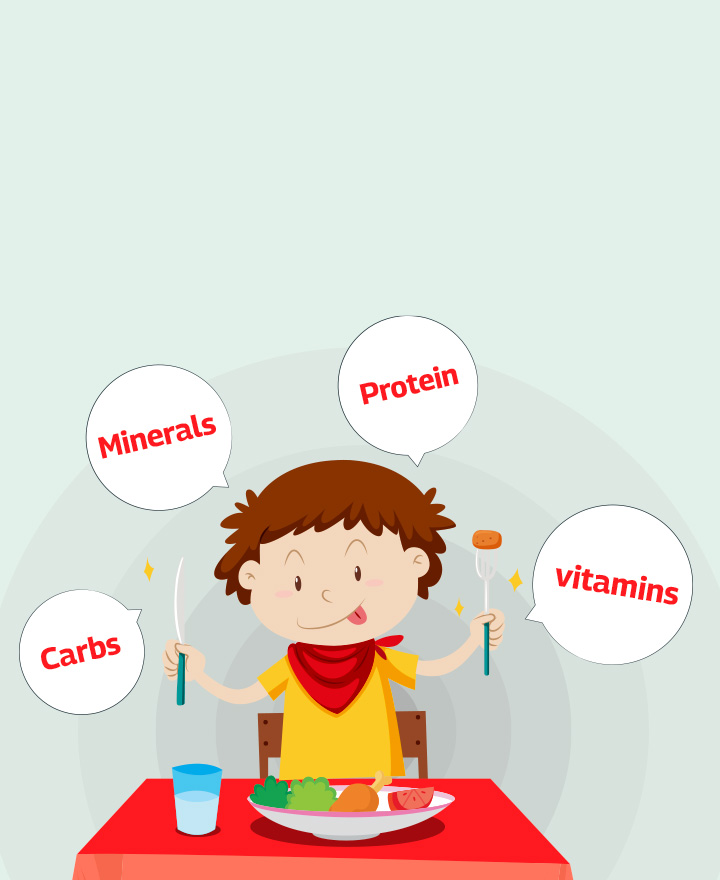

Nutritional Benefits of Poha
Poha, a flattened rice dish popular in India, is a nutritious breakfast option for children. Packed with carbohydrates, protein, fibre, iron, and essential vitamins and minerals, poha offers a range of benefits for growing children. Read on to learn about the reasons of why this dish can be a valuable addition to your child's diet.
Poha Nutrition Facts
Poha is a powerhouse of essential nutrients crucial for a child's development. The nutritional value can vary depending on the ingredients and preparation method, but a typical serving of poha (approx 150 grams) provides the following:
•Calories : 150 – 200 kcal
•Carbohydrates : 30 – 35 grams. It is a primary source of energy for children and it provides sustained energy throughout the morning, keeping them active and focused at school.
•Protein : 3 – 5 grams. Essential for building and repairing tissues, protein in poha helps support healthy growth and development in children.
•Dietary Fibre : 2 – 4 grams. Poha is a good source of dietary fibre, which promotes healthy digestion and keeps your child feeling full for longer.
•Fat : 2 – 5 grams. This depends on the amount of oil used in preparation.
•Vitamins and Minerals : Poha also contains essential vitamins and minerals like vitamin B6, magnesium, iron, and potassium, all of which play vital roles in various bodily functions.
Poha is relatively low in fat and can be a good source of energy, especially when combined with protein-rich ingredients like peanuts or legumes. The addition of vegetables enhances its nutritional profile by providing extra vitamins and fiber.
Are Poha Calories Enough?
Poha calories per 100g are a good starting point for a healthy breakfast for children. This serving typically provides around 100 - 130 calories, and while this can be nutritious part of a meal due to its carbohydrate content, it may not be enough on its own to meet overall health needs.
Here's how nutrition in poha can potentially benefit your child's health —
•Energy Source
The carbohydrates in poha provide sustained energy, allowing children to focus on schoolwork and participate in physical activities throughout the morning.
•Blood Pressure
Poha's low sodium content makes it a good choice for maintaining healthy blood pressure levels in children.
•Digestion
The dietary fibre in poha promotes healthy digestion and regularity, reducing the risk of constipation in children.
•Heart Health
Poha is naturally low in fat and cholesterol, making it a heart-healthy option for children.
It's important to remember that these are potential benefits, and further research is needed to confirm their full extent.
Conclusion
Poha, with its well-rounded nutrition, is a delicious and convenient breakfast option for children. It provides them with the energy and essential nutrients they need to start their day right. Remember, a balanced diet is key for optimal health. Pair poha with other healthy foods like fruits, milk, or vegetables to create a complete and nutritious breakfast for your child.
One of the important components of our overall wellness is also being financially secured. Healthcare emergencies can happen any time, but a good health insurance policy can protect you from such uncertain situations. To know more about Wellness and other health related tips, visit the wellness corner.
Source: healthline, masterclass, webmd, medicalnewstoday
Disclaimer: This blog provides general information and discussions about health and related subjects. The information and other content provided in this blog, website or in any linked materials are not intended and should not be considered, or used as a substitute for, medical advice, diagnosis or treatment. Kindly contact your Doctor before starting a new medicine or health regime.
Related Articles
10 Foods Rich in Calcium & Vitamin D for Stronger Bones
Ways to Include Protein-Rich Food in Your Diet
High-protein Plant-based Foods for Vegans
Top 10 High-Fiber Foods to Help Your Digestive Health
Include More Calcium- Rich Foods in Your Diet – Here Is Why
Published on August 19, 2024














 Health Insurance
Health Insurance  Travel Insurance
Travel Insurance  Car Insurance
Car Insurance  Cyber Insurance
Cyber Insurance  Critical Illness Insurance
Critical Illness Insurance
 Pet Insurance
Pet Insurance
 Bike/Two Wheeler Insurance
Bike/Two Wheeler Insurance  Home Insurance
Home Insurance  Third Party Vehicle Ins.
Third Party Vehicle Ins.  Tractor Insurance
Tractor Insurance  Goods Carrying Vehicle Ins.
Goods Carrying Vehicle Ins.  Passenger Carrying Vehicle Ins.
Passenger Carrying Vehicle Ins.  Compulsory Personal Accident Insurance
Compulsory Personal Accident Insurance  Travel Insurance
Travel Insurance  Rural
Rural